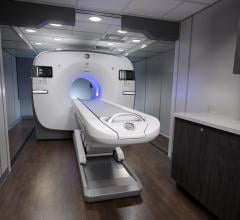October 19, 2010 — CardioGen-82 (Rubidium Rb 82 Generator) when used with positron emission tomography (PET) myocardial perfusion imaging (MPI) has been shown to produce “reasonably low radiation exposure” of 3.7mSv for a complete rest/stress study. 1
Confirmed in the recently published study “Human Biodistribution and Radiation Dosimetry of 82Rb,” led by Frank Bengel, M.D., of Johns Hopkins University and featured in the October issue of Journal of Nuclear Medicine, this finding is added testament to the enhanced diagnostic ability and safety of this PET myocardial perfusion tracer.
“As the number of cardiovascular imaging procedures continues to increase, the concerns over radiation exposure have become an important issue. Our study provides scientific evidence for this discussion,” Bengel said. “It resolves a discrepancy between previously available estimates of radiation dose from rubidium-82. It confirms that rubidium-82 PET is at the lower end of radiation dose among cardiac imaging procedures involving ionizing radiation.”
Bengel evaluated 10 healthy volunteers who underwent dynamic PET/computed tomography (CT) — six contiguous table positions, each with separate 82Rb infusion. Source organ volumes of interest were delineated on the CT images and transferred to the PET images to obtain time-integrated activity coefficients. From the study, Dr. Bengel concluded that the current 82Rb dosimetry suggests reasonably low radiation exposure. On the basis of this study, a clinical 82Rb injection of 2 . 1,480 MBq (80 mCi) would result in a mean effective dose of 3.7 mSv using the weighting factors of the ICRP 103 – only slightly above the average annual natural background exposure in the United States (3.1 mSv). 1
Reference:
1. Bengel et al. Human Biodistribution and Radiation Dosimetry of 82Rb. Journal of Nuclear Medicine. 2010.
For more information: www.braccoimaging.com
© Copyright Wainscot Media. All Rights Reserved.
Subscribe Now


 July 30, 2024
July 30, 2024 








